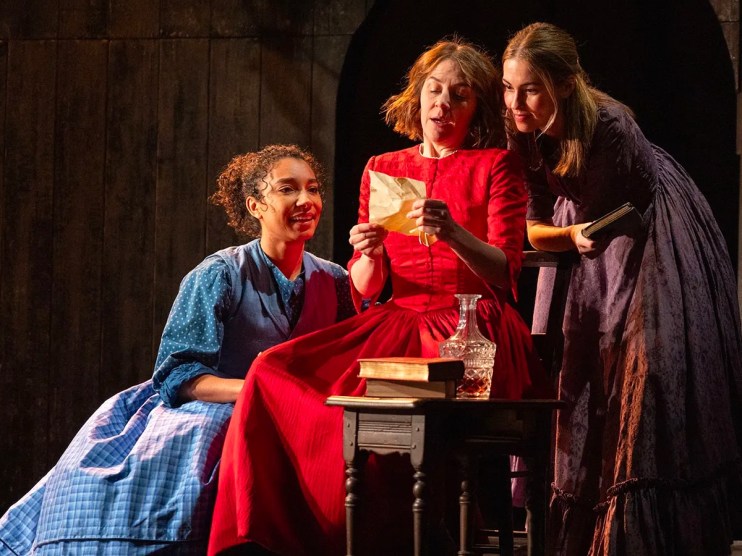Underdog: The Other Other Bronte at the Dorfman Theatre review

Underdog: The Other Other Bronte – The Dorfman Theatre ★★★☆☆
Sibling relationships are typically tempestuous and none more so than that of the Bronte sisters. After all, throw three women, an alcoholic brother, a flair for gothic writing and a rigid patriarchal structure into a pot and you’re bound to end up with a wicked concoction.
A stew with far too many ingredients is a suitable metaphor for Underdog: The Other Other Bronte. Written by Sarah Gordon and directed by Natalie Ibu, it explores the relationship between Charlotte, Emily and the other, other Bronte, Anne.
Despite the title, this is Charlotte’s story, really. In a stunning opening, Charlotte, played by the excellent Gemma Whelan of Game of Thrones fame, bursts into the theatre, lights still aglare, and demands to know the audience’s favourite Bronte novel. “Jane Eyre, Jane Eyre”, people inevitably cry, to her devilish delight. She tells the audience how a woman’s success often comes at another woman’s expense: at the end of the first act, Charlotte wickedly declares “I’m winning!”
There are flashes of brilliance in Gordon’s play. At one point Charlotte literally clambers into a display case box in an art gallery before the ghost of her sister tempts her back out. The dialogue is generally excellent – plausible and often funny, if a little reliant on contemporary expletives. The Brontes speak to each other in that brutal and intimate manner unique to siblings: they tell each other to “fuck off”, finish each other’s jokes and hold grudges.
But the themes soon start piling up: talent (what is it?); the elite and poncy world of literary criticism; female competition; beauty standards (Anne is hot, the resentful Charlotte so ugly as to be “unloveable”); legacy; the origin of literary ideas. I tried to clutch at these themes as they swirled incessantly like the hundreds of book rejection letters that fall from the ceiling in the first act, but it was largely futile and frustrating.
Underdog feels like a play for women and more specifically women with siblings. “Do you have a sister?” the woman to my left asked me. “I do,” I said. And in fact, we had just had a blazing row (in a restaurant, embarrassingly). My new friend told me that after the death of her parents, her sister had really stepped up. I told her, with more candidness than I expected, that when my sister and I fight, my whole world implodes but when we’re close, there’s no emotional connection like it.
Part of me resents the impression this play gives: that women fight and squabble and wish failure upon each other and are envious and mean and cruel. But the play puts this reality firmly in its historical and persisting context. A clever conceit is a panel of bumptious, bespectacled literary critics who circle the stage on a revolving panel with their harsh words amplified and bellowing. They are impressed by the “Bells” – the male pseudonyms taken by the sisters – before they become the Brontes, patently demonstrating their blind prejudice and jibing at the grossly inflated, often malevolent influence of critics.
The idea of legacy dominates the second act. Emily kicks the bucket aged just 29 and Anne swiftly follows. At this point, despite the tone of the play thus far being largely comedic, Charlotte takes on the role of a romantic poet and waxes lyrical for 10 minutes about rearranging the stars in the sky, then the play canters to an abrupt end.
Underdog is not especially deep, nor particularly innovative, and it’s certainly not historically faithful – but it doesn’t claim to be. Short and ambitious, it hurls ideas into the Yorkshire air, many of which land flat. But examinations of sisterhood are depressingly rare, so when those ideas are explored, they hit hard.